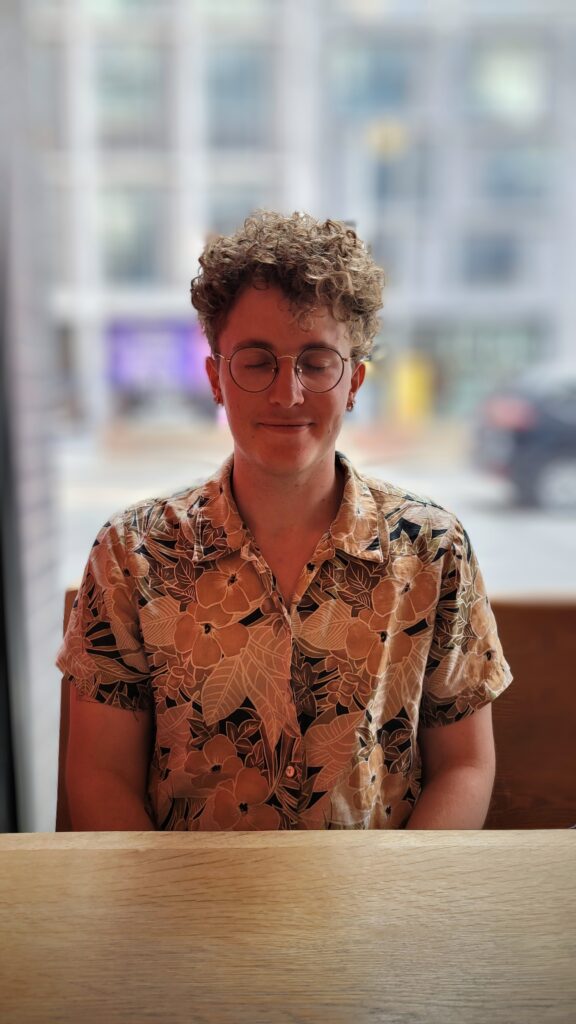The Vape Pen is Mightier Than the Sword: Mythical Ponderings with Jesse Vriend

Myths, musicals, Marvel movies, and the Mabinogion: Jesse Vriend is in pondering mode, and I’m along for the ride. It’s a Monday afternoon in early July and we’re sitting at Mallo, a café on Bathurst with ribbons of neon lights on the ceiling and a cute little cactus on the table.
I met Vriend in 2017 through a creative writing course at Queen’s. For a semester, I took great joy in hearing their incisive feedback, as well as reading their eerily well-crafted stories. As an undergraduate student, Vriend performed with Colliding Scopes and The Imaginary Theatre Company and collaborated with Golden Boy Productions on sketch comedy videos. While I remained in Kingston, Vriend went on to study philosophy at the University of Guelph and now lives in Toronto. They recently performed in a pandemic-era production of Twelfth Night with Paul De Jong.
This interview has been edited for length and clarity, and contains strong language.
As we sip iced tea, we talk about Hadestown, Anaïs Mitchell’s Tony award-winning retelling of the Orpheus and Eurydice myth which is currently playing at Mirvish. Vriend came away from the show with several questions. “I was getting weepy throughout the end of the play. But I felt like—not that I had been manipulated, it’s not like it was a Toy Story movie—but it is pretty bare bones. It’s not like I was getting attached to the characters. It’s not like the characters felt particularly human. The characters were caricatures. So how is it that I am feeling so much sympathy, empathy, whatever, for these caricatures? That seems somehow like a hack.”
This got them wondering about how to apply this mythical hack in their own work. “Is this something I could do as a playwright? How can I tap into that pathos?… It’s weird that you can be that broad and still hit that hard emotionally. Is this just because it’s 4000 years old?… [Hadestown] takes this very minimalistic story package and wraps it up in just enough poetry for it to resonate emotionally and not to land as a pantomime, as a clown show.”
Vriend mentions a new script they’re working on, which follows a person who’s struggling to quit nicotine and the pressure it puts on their friendships as they repeatedly take up vaping again. I point out that this premise is not too different from Hadestown, which advocates for the value of retelling a doomed love story even when we know how it ends. Quitting a habit is its own kind of mythic task. “Very much so. This is a connection that I’m only making right now, and we were kind of joking about it. But the thing is repetition… Each time you approach the conflict, you’re bringing the weight of every past time you’ve confronted it. I guess that’s part of why myths get away with what they get away with—they’re drawing on repetition. And that is what’s going on in Untitled Vape Play.”
While they’ve successfully put down the vape pen for the time being, Vriend is familiar with the cyclical structure of the struggle. “I’ve been in this situation a bunch of times now where I’ve given my friends my vape, and been like, please don’t let me have this. Please, please, please deprive me of my ability to satisfy my addiction. And then the next day or the next week, going back to them and being like, please, please, please, I beg of you, let me satisfy my addiction.” They laugh. “And it’s really interesting to me… the problem you’re giving your friend by making this request of them. It’s kind of putting them in a situation where they can’t win. Whatever they do, it’s a bit of a tragedy. That’s so much of good mythology: it’s people in situations where there is no right choice.”
Vriend has been on a deep dive into Welsh mythology of late, reading the Mabinogion. “It’s kind of a scattershot of different Welsh stories. Some of them from an oral tradition, some of them from medieval writers. There’s not really anything in particular that unites all the stories other than that they were thrown together in this one volume in the Middle Ages that got really popular. I recently read a bit of a rage bait blog post talking about how Marvel movies are bad… And for some reason, the comparison was to the Mabinogion. I’ve had a copy of it for a while, but that’s part of what inspired me to actually open it. Honestly, I don’t see that it’s much better than Marvel movies, which does seem like evidence in favour of the power of myth being the authority of time more than anything. It makes me wonder if one day I’ll go and see a musical retelling of a Marvel movie and it will hit much, much harder than the original ever did.”
In the meantime, Vriend sees these ponderings as a jumping-off point to think about earnestness in storytelling. “All of these heroes of the medieval and premedieval myths, their quests are so earnest, and yet so silly and misguided every single time… That is part of what I think works about the vape premise. Vaping is inherently stupid and funny and absurd. So playing this as straight as possible, and having that kind of tension between real human drama and a conceit which makes no fucking sense. I think there’s something inherently kind of relieving about that. That’s real absurdity, when you have something that’s genuine and heartfelt, and, ultimately, total nonsense.”
To keep up with Jesse Vriend’s ponderings, visit their blog. For local resources on substance use health, visit KFL&A Public Health here.
This article was edited on December 1st, 2023 to update formatting.